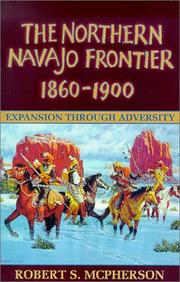| Listing 1 - 2 of 2 |
Sort by
|

ISBN: 0874214246 9786613267412 1283267411 0874216710 9780874216714 9780874214246 Year: 2001 Publisher: Logan, Utah Utah State University Press
Abstract | Keywords | Export | Availability | Bookmark
 Loading...
Loading...Choose an application
- Reference Manager
- EndNote
- RefWorks (Direct export to RefWorks)
McPherson argues that, instead of being a downtrodden group of prisoners, defeated militarily in the 1860s and dependent on the U.S. government for protection and guidance in the 1870s and 80s, the Navajo nation was vigorously involved in defending and expanding the borders of their homelands. This was accomplished not through war nor as a concerted effort, but by an aggressive defensive policy built on individual action that varied with changing circumstances. Many Navajos never made the Long Walk to Bosque Redondo. Instead they eluded capture in northern and western hinterlands and ther--
Frontier and pioneer life - Southwest, New. --- Frontier and pioneer life -- Southwest, New. --- Indians of North America -- Southwest, New -- Captivities. --- Indians of North America -- Southwest, New -- Wars. --- Navajo Indians -- Captivities. --- Navajo Indians - History. --- Navajo Indians - Land tenure. --- Navajo Indians -- Wars. --- Gender & Ethnic Studies --- Social Sciences --- Ethnic & Race Studies --- Navajo Indians --- Frontier and pioneer life --- History. --- Land tenure. --- Diné Indians (Navajo) --- Navaho Indians --- Athapascan Indians --- Indians of North America
Book
ISBN: 128235163X 9786612351631 0300156219 9780300156218 9780300140682 0300140681 Year: 2009 Publisher: New Haven Yale University Press
Abstract | Keywords | Export | Availability | Bookmark
 Loading...
Loading...Choose an application
- Reference Manager
- EndNote
- RefWorks (Direct export to RefWorks)
From the Publisher: In 1513, when Ponce de Leon stepped ashore on a beach of what is now Florida, Spain gained its first foothold in North America. For the next three hundred years, Spaniards ranged through the continent building forts to defend strategic places, missions to proselytize Indians, and farms, ranches, and towns to reconstruct a familiar Iberian world. This engagingly written and well-illustrated book presents an up-to-date overview of the Spanish colonial period in North America. It provides a sweeping account not only of the Spaniards' impact on the lives, institutions, and environments of the native peoples but also of the effect of native North Americans on the societies and cultures of the Spanish settlers. With apt quotations and colorful detail, David J. Weber evokes the dramatic era of the first Spanish-Indian contact in North America, describes the establishment, expansion, and retraction of the Spanish frontier, and recounts the forging of a Hispanic empire that ranged from Florida to California. Weber refutes the common assumption that while the English and French came to the New World to settle or engage in honest trade, the Spaniards came simply to plunder. The Spanish missionaries, soldiers, and traders who lived in America were influenced by diverse motives, and Weber shows that their behavior must be viewed in the context of their own time and within their own frame of reference. Throughout his book Weber deals with many other interesting issues, including the difference between English, French, and Spanish treatment of Indians, the social and economic integration of Indian women into Hispanic society, and the reasons why Spanish communities in North America failed to develop at the rate that the English settlements did. His magisterial work broadens our understanding of the American past by illuminating a neglected but integral part of the nation's heritage.
Spaniards --- Frontier and pioneer life --- Spanish people --- Ethnology --- History. --- Southwest, New --- Southern States --- History --- Spaniards -- Southwest, New -- History.. --- Spaniards -- Southern States -- History.. --- Frontier and pioneer life -- Southwest, New.. --- Frontier and pioneer life -- Southern States.. --- Southwest, New -- History -- To 1848.. --- Southern States -- History -- Colonial period, ca. 1600-1775.
| Listing 1 - 2 of 2 |
Sort by
|

 Search
Search Feedback
Feedback About UniCat
About UniCat  Help
Help News
News